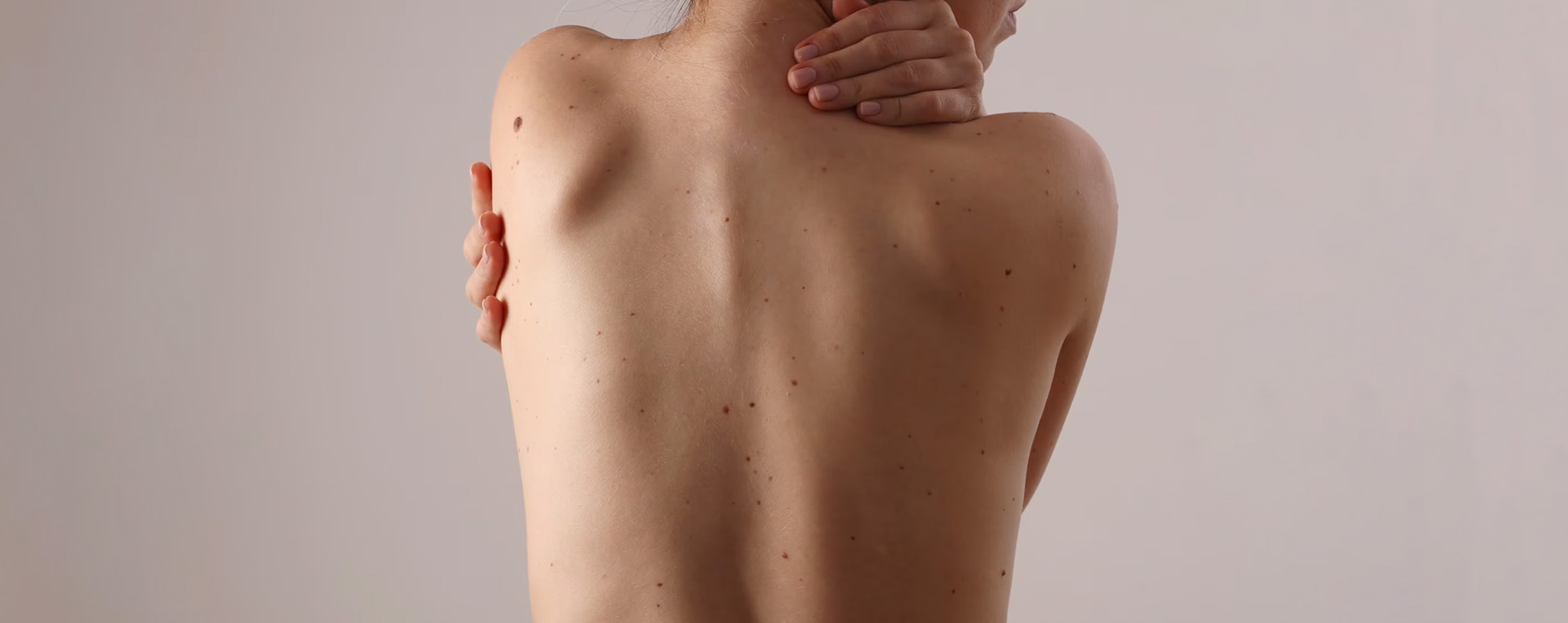
Mole
We all have at least one mole on our body. They can be present from birth or even occur during life. Usually moles are harmless, but they can change and, in the worst case, lead to skin cancer.
Mole removal is also a quick and highly effective procedure with no cancer risk, which any patient would like removed purely for aesthetic reasons.
Beauty spot
Anaesthesia
Aftercare
Length
Work
Risks
Sports
Treatment procedure
At the Bellefontaine Clinic
Before the procedure
The patient’s health issues are first clarified. The entire skin and moles will be examined from head to toe. It is discussed and drawn, which moles exactly need to be removed. Together, we decide which closure procedure will give you the best possible “aesthetic” result. The decision depends on the age, type, colour, quality, area and elasticity of the skin. In order not to endanger the wound healing process after surgical correction, it is generally advisable not to smoke for about 14 days before and after the operation.
During the procedure
The procedure is usually performed under local anaesthesia. The birthmark is excised with as little tissue loss as possible. It is important that the mole is also excised sufficiently deep to avoid any recurrence. The subcutaneous tissue is specially prepared so that we can close the wound with as little tension as possible. At the end of the procedure, we apply special dressings to the wound so that the scar is as little stretched as possible.
After the procedure
After the excision of moles, the stitches must be removed within 7 days on the face and 14 to 21 days on the body. During this period, you should refrain from sports for at least 3 weeks. 3 weeks after the procedure, you can treat the scar with a special scar ointment, silicone patches and optionally compression bandages. You must do without the sun or use an ointment with a sun protection factor of 50 + as long as the scar is red.
Risks and side effects
Local swelling and bruising may occur during the first 2 weeks. Infections and hematomas are very rare. Sensory disturbances usually disappear a few weeks after the operation. A pathological scar or hypertrophic, keloid scar may sometimes appear.
General information
In Cindy Crawford’s case, it became a personal mark: a mole on her left cheek. Some moles are present from birth, others occur during life. Several factors can influence the presence of moles throughout life: hormonal fluctuations, genetic predisposition, UV radiation and a weakened immune system. If the size, shape or colour of a mole changes, it may be the first signs of an emerging disease such as skin cancer. Patients who have a lot of nevi are particularly at risk. Benign or malignant – the A-B-C-D-E rule allows for an initial assessment:
A Asymmetry: The nevus is irregular, i.e. neither round nor oval.
B Border: The edge is irregular.
C Colour: Colouring has changed.
D Diameter: It is greater than 5 mm.
E Evolution: The nevus begins to bleed or scratch.
The removal of a mole may be desired for purely aesthetic or medical reasons. While small moles can usually be easily removed within minutes under local anaesthesia, larger birthmarks, especially on the face, should be excised by an FMH specialist in plastic and cosmetic surgery.
A Asymmetry: The nevus is irregular, i.e. neither round nor oval.
B Border: The edge is irregular.
C Colour: Colouring has changed.
D Diameter: It is greater than 5 mm.
E Evolution: The nevus begins to bleed or scratch.
The removal of a mole may be desired for purely aesthetic or medical reasons. While small moles can usually be easily removed within minutes under local anaesthesia, larger birthmarks, especially on the face, should be excised by an FMH specialist in plastic and cosmetic surgery.
Prices
| Treatments | Rates |
|---|---|
| MOLE – FACE | FROM 600 UNDER AL |
| MOLE – BODY | FROM 400 UNDER AL |
Contact
Do you have any questions or would you like to make an appointment? You can write us your request via our contact form or call us on +41 21 601 33 33. We look forward to your visit!

